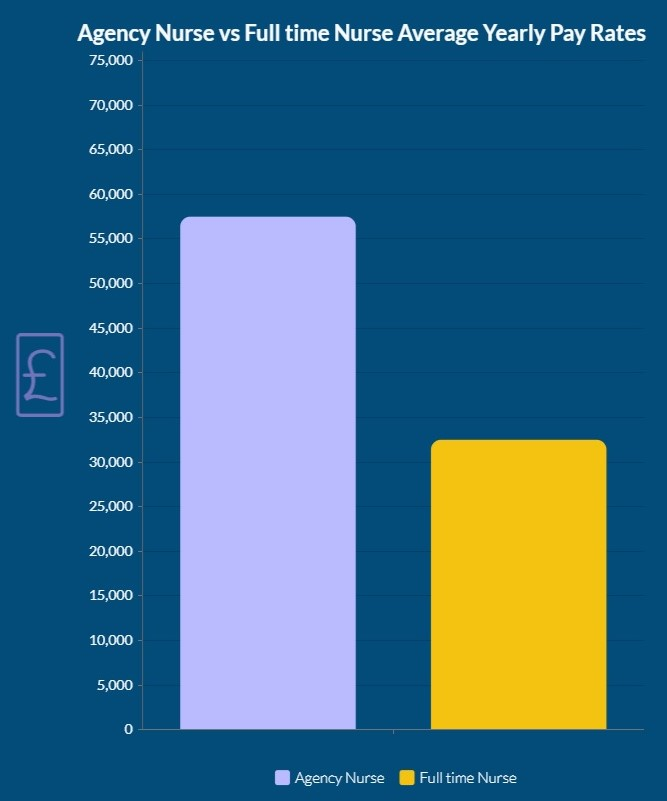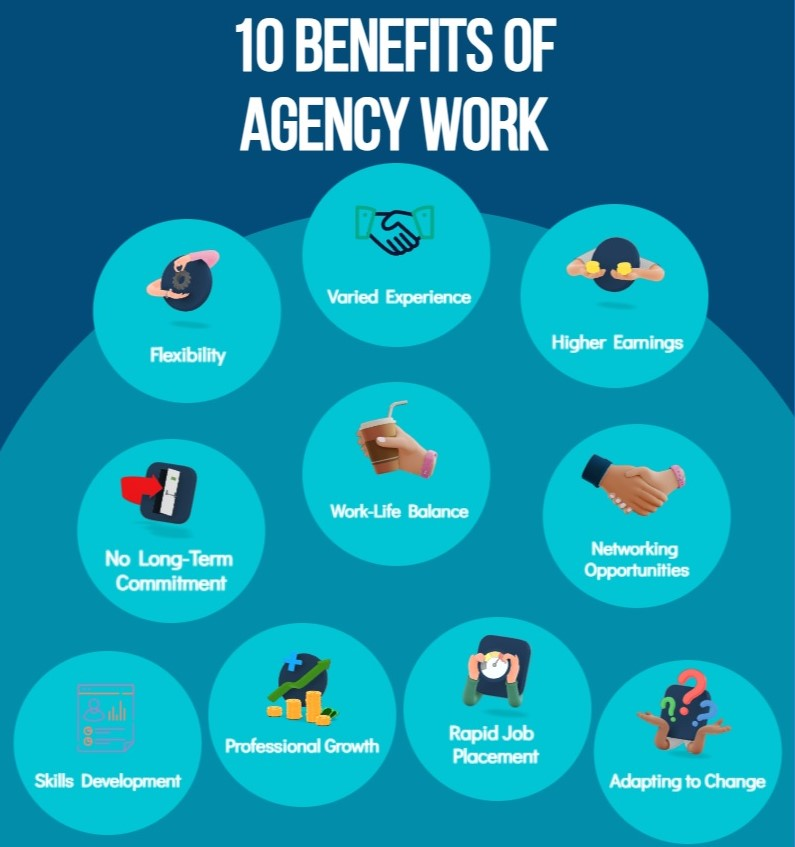
Nursing in the UK can be a complex landscape to navigate. We’ve put together this guide to help nurses compare agency nurse pay rates to staff nurse pay rates and get more clarity on their earning potential.
As a nurse, you have probably heard of the term “agency nursing” or may have even considered it as a way to earn extra income. But have you ever wondered how agency nurse pay rates compare to staff nurse pay rates?
In this blog post, we will explore the differences between the two in detail. We will also examine several key factors that determine agency nurse pay rates, including income tax, national insurance, pension scheme, and sick pay, among others.
So, whether you are a new nurse or an experienced one, read on to discover everything you need to know about agency nurse pay rates and how they compare to staff nurse pay rates.
So what is an agency nurse?
An agency nurse is a registered nurse who works on a temporary basis through a healthcare staffing agency rather than being directly employed by a specific healthcare facility or organisation. These nurses are also known as locum nurses or temporary nurses.
They are hired by the agency and then assigned to work in various healthcare settings, such as hospitals, clinics, nursing homes, or community care facilities, to fill in staffing gaps or cover short-term needs.
Agency nurses provide valuable support to healthcare facilities, especially during busy periods, staff shortages, or when additional expertise is required and can range from a few shifts per month to full-time job, depending on the need for nurses and will be remunerated accordingly!
Average Agency nurse pay rates vs Staff nurse pay rates?
A survey taken from numerous sources shows agency nurses can expect to receive much higher nursing pay rates, in the region of £55,000 – £60,000 per year on the provision they work full time.
On the other hand, a full time staff nurse can expect to receive lower pay rates in the region of £30,000 – £35,000 per year.
This figure will change based on experience, location, and the healthcare facility. It’s also important to note that salaries and hourly pay rates will change over time, but hopefully this should give you a valuable insight and what to expect with your agency nursing pay!

Nature of work, Agency nurse vs Staff nurse?
The nature of work for NHS agency nurses and staff nurses sets them on distinct paths. NHS agency nurses, employed on a temporary basis through healthcare staffing agencies, enjoy unparalleled flexibility in their schedules and the freedom to choose where and when they work with greater earning potential. In contrast, staff nurses secure permanent positions within specific healthcare facilities, providing them with job security and opportunities for long-term career growth.
The nature of their roles also diverges when it comes to work environment and responsibilities. Staff nurses find consistency within their chosen healthcare facility, fostering relationships with colleagues and patients over time. On the other hand, agency nurses venture into diverse settings, affording them the chance to gain varied experiences but often lacking in continuity.
Despite the differences, both agency nurses and staff nurses share similar roles in delivering essential patient care. Ultimately, the choice between agency and staff nursing depends on individual preferences and career aspirations, each offering its unique advantages and opportunities for nursing professionals in the UK.
Advantages of agency work?
Flexibility – enjoy the freedom to choose your working hours and locations, allowing you to create a schedule that suits their lifestyle and personal commitments.
Varied Experience – Working in different healthcare settings exposes agency nurses to diverse patient populations and medical conditions, enhancing their clinical skills and knowledge.
Higher Earnings – Agency nurses often earn higher hourly rates than their staff nurse counterparts due to the temporary nature of their work and the additional flexibility they offer to employers.
No Long-Term Commitment – Agency nursing provides the option to work on a temporary basis, giving nurses the opportunity to try out different healthcare settings without committing to a permanent position.
Work-Life Balance – The ability to control your schedule and working hours allows agency nurses to strike a better work-life balance, reducing burnout and improving overall job satisfaction.
Networking Opportunities – Interacting with various healthcare teams and facilities provides agency nurses with ample networking opportunities, which can lead to potential long-term job prospects or career advancement.
Skills Development – Exposure to different healthcare settings challenges agency nurses to adapt quickly and develop their problem-solving and critical-thinking skills.
Professional Growth – Working as an agency nurse allows individuals to stay updated with the latest practices and advancements in healthcare due to their exposure to various organisations.
Rapid Job Placement – Healthcare staffing agencies can quickly place agency nurses into available positions, reducing the time between job searches and employment.
Adapting to Change – Agency nurses become skilled at adjusting to new environments, making them adaptable professionals who can handle various challenges.

Advantages of being a staff nurse?
Job Stability – Staff nurses typically have permanent positions within healthcare facilities, providing a stable and consistent source of income.
Career Progression – Staff nurses have opportunities for career advancement within the same organisation, such as becoming charge nurses, clinical specialists, or nurse managers.
Benefits and Job Security – Permanent Workers often receive comprehensive benefits packages, including health insurance, retirement plans, paid time off, and job security in the form of regular employment contracts.
Continuity of Care – Working in a fixed healthcare setting allows staff nurses to build relationships with patients and their families, providing consistent care and support throughout their healthcare professionals journey.
Team Collaboration – Staff nurses become integral members of healthcare teams, fostering strong collaboration with colleagues.
Training and Development – Healthcare facilities invest in the professional development of staff nurses, offering continuous training and opportunities to attend further education.
Specialisation Opportunities – Staff nurses can pursue specialised certifications and training in specific nursing fields, such as critical care, paediatrics, or oncology.
Comprehensive Benefits – In addition to competitive salaries, staff nurses may receive benefits like sick leave, maternity leave, and paid holidays, enhancing their work-life balance.
Regular Working Hours – Staff nurses typically work regular shifts, which may be more suitable for those seeking predictable work hours.

How do I get paid?
An Agency worker will establish with the agency or their individual consultant when they will need to submit a timesheet showing the amount of hours they have worked for the week and will generally be paid their take home pay on a weekly basis for a week in arrears. (This will rarely be on a monthly basis).
For example:
John works 37 hours from the 1st to the 5th and John’s consultant has a timesheet cut off for the following Monday (8th). John would submit the 37 hours to the consultant prior to Monday and will be paid on the upcoming Friday (12th – 1 week in arrears). This will be done in one of the 3 ways:
Paid PAYE (Pay As You Earn) – You may be paid PAYE through the agencies in house system, where income tax, national insurance and other deductions are automatically taken from their pay before they receive it and the agency deducts tax.
Umbrella Company – Some agency nurses choose to work through umbrella companies, which handle their payroll, deduct income tax, national insurance and other administrative tasks on their behalf including student loan repayments and paid your net pay directly into your bank account.
Limited Company (Personal Service Company) – Agency nurses who operate as their own limited company can receive payments as directors or employees of their own companies, which may have tax implications.
Umbrella Company vs Personal Service Company (Ltd Co).
Working as an umbrella company and your own limited company are two different ways that agency nurses can operate as self-employed individuals. When working under an umbrella company, agency nurses are employed by the umbrella company itself. The agency nurse submits their timesheets to the agency or umbrella company, and they handle all payroll, national insurance, taxes, holiday pay and administrative tasks on their behalf. This option provides simplicity and convenience as the umbrella company takes care of all the paperwork.
On the other hand, working as a limited company means the agency nurse sets up their own limited company and becomes its director or employee. As a limited company, the nurse is responsible for invoicing the healthcare facility directly and managing their finances.
The choice between the two options depends on the nurse’s individual preferences, level of comfort with administrative tasks, and the tax implications they wish to consider. Each option has its advantages and complexities, so it’s crucial for agency nurses to carefully weigh the differences and seek professional advice if needed to make an informed decision.
Advantages of Umbrella Company:
Simplicity
Operating through umbrella companies is simpler and involves less of a registration process compared to setting up and managing a limited company. The umbrella company takes care of tasks such as invoicing, tax calculations (national insurance contributions), and payroll on a weekly or monthly basis, allowing contractors to focus on their work.
Employment benefits
An agency worker through an umbrella company are considered employees of the company. This means they may have access to certain employment benefits, such as statutory holiday pay, and pension schemes.
Tax efficiency
While limited companies may provide more tax planning options, umbrella companies still offer tax advantages. Umbrella company contractors can claim allowable expenses and are typically taxed under the Pay As You Earn (PAYE) system, avoiding the administrative burden of managing taxes themselves while making the correct deductions.
Quick setup
Joining an umbrella company is a quick and straightforward process and can take as little as 24 hours. An agency worker can start working under the umbrella company without the need for complex company formations or registrations.
Flexibility
Nurses working through an umbrella company can easily switch between assignments or contracts without the need for making changes to their employment structure or company setup. This flexibility allows for seamless transitions between different projects or clients.
Advantages of Personal service company:
Tax efficiency
Operating through a limited company can potentially provide certain tax reliefs. Agency workers can take advantage of tax-deductible expenses, dividends, and potential tax-saving strategies.
Business control
Having a limited company gives contractors full control over their business operations. They can make decisions regarding contracts, invoicing, and financial management including your company tax return, allowing for a more independent and autonomous approach.
Professional image
Working as a limited company can enhance the professional image of contractors. Clients and potential employers may perceive limited companies as more established and serious businesses, which can contribute to credibility and potentially attract higher-paying contracts.
IR35 Legislation and why it’s important!
In simple terms IR35 is a set of tax regulations in the UK that determines whether an agency nurse is considered an employee for tax purposes. It affects both umbrella company and limited company.
If the client (NHS Trusts) determine you are inside of IR35, then an umbrella company/PAYE system would be used and you would be deemed as an employee and if you are deemed outside of IR35 then you are free to choose between a Limited company, PAYE or an umbrella company and can be deemed as self employed.
Working a role outside of IR35 as a Nurse is possible but can be few and far between, it’s important to establish with your agency whether you fall inside or outside of this legislation otherwise you could be subject to further tax liability, penalties, backdated Claims, loss of Tax Benefits and Future Opportunities.
Where do I find agency work?
To work as an agency nurse, you’ll need to register with a nursing agency or NHS organisations who provide contract jobs. An agency act as intermediaries between agency nurses and healthcare organisations that require short-term staffing solutions. They provide support and ensure that the agency nurse is competent, safe, and capable of delivering the highest standard of care to patients.
Ready to take your medical career to the next level? Look no further than our jobs board, featuring hundreds of exciting agency nurse openings and nursing agencies just waiting for someone like you. Don’t miss this opportunity to land your dream job and make a difference in the healthcare industry. Start browsing now!
Alternatively, find our user-friendly job board platform below:


[…] Agency Nurse Pay Rates vs Staff Nurse Pay Rates | CVLocum […]
[…] Agency Nurse Pay Rates vs Staff Nurse Pay Rates | CVLocum […]